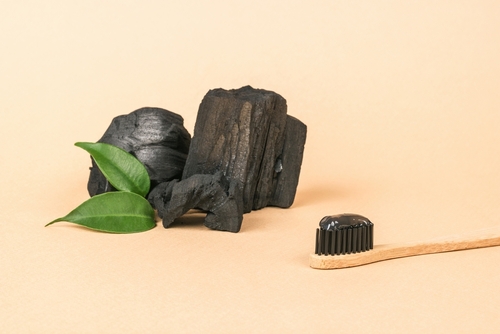
by elision | Jul 31, 2023 | Activated Charcoal, Dentist
[vc_row][vc_column][vc_column_text]
You may have seen ads or social media posts claiming that charcoal in toothpaste and toothbrushes can help achieve a brighter and healthier smile. But is charcoal truly good for your teeth? Let’s take a close look at charcoal in dental products and separate fact from fiction.
Pros of Charcoal Dental Products
Potential Surface Stain Removal
Charcoal has adsorbent properties, which means it can bind to certain compounds, including surface stains on teeth. This can help remove superficial stains and provide a temporary improvement in tooth color.
Freshening Effects
Activated charcoal has a porous structure with a large surface area. This gives it a unique ability to draw in food particles and other harmful substances from the mouth, leading to fresher breath. Additionally, the grainy texture of charcoal toothpaste may provide a mild exfoliating effect, leaving your teeth feeling cleaner and smoother.
Cons of Charcoal Dental Products
Abrasive Cleaning
Charcoal dental products tend to be gritty and coarse. While a certain level of abrasiveness is necessary for effective cleaning, excessive abrasion can damage tooth enamel over time, leading to increased tooth sensitivity and potential enamel erosion.
Lack of Fluoride
Many charcoal toothpaste options do not contain fluoride, a vital component in preventing tooth decay. Fluoride strengthens tooth enamel and helps protect against cavities. Therefore, relying solely on charcoal dental products may leave your teeth more susceptible to decay and other problems.
Unproven Long-Term Effects
Despite claims of its benefits, the long-term effects of charcoal dental products remain uncertain. Limited scientific research exists to support the claims made by manufacturers, and the potential risks associated with prolonged and exclusive use of these products have not been thoroughly studied.
Potential Mess and Staining
Charcoal can be messy, leaving dark residue on the sink, toothbrush, and even your gums. Additionally, the black color of charcoal toothpaste may temporarily stain toothbrush bristles, and lodged charcoal particles can make them harder to clean.
Professional Guidance Is Key
While charcoal dental products may have some potential benefits, it’s important to remember that oral health decisions should be made with the guidance of dental professionals. Here are a couple of recommendations:
1. Consult Your Dentist.
Before incorporating charcoal dental products into your oral care routine, consult your dentist. They can evaluate your oral health, assess the need for teeth whitening, and provide personalized recommendations based on your unique circumstances.
2. Maintain a Comprehensive Oral Care Routine.
Remember that dental health extends beyond just teeth whitening. Brushing twice a day with fluoride toothpaste, flossing daily, and visiting your dentist regularly are crucial for maintaining optimal oral health and a beautiful smile.
Professional Teeth Whitening in Joliet
While charcoal dental products may offer some benefits, their potential risks and long-term effects must be considered. The best approach to oral care is a comprehensive one that includes professional advice, a balanced diet, regular dental check-ups, and a consistent oral hygiene routine.
At Smile League Dental, we prioritize your oral health and provide expert guidance for achieving a healthy, beautiful smile. We take pride in providing professional teeth whitening options that are safe, effective, and tailored to your specific needs. You can contact us at 815-782-6243.
[/vc_column_text][/vc_column][/vc_row]
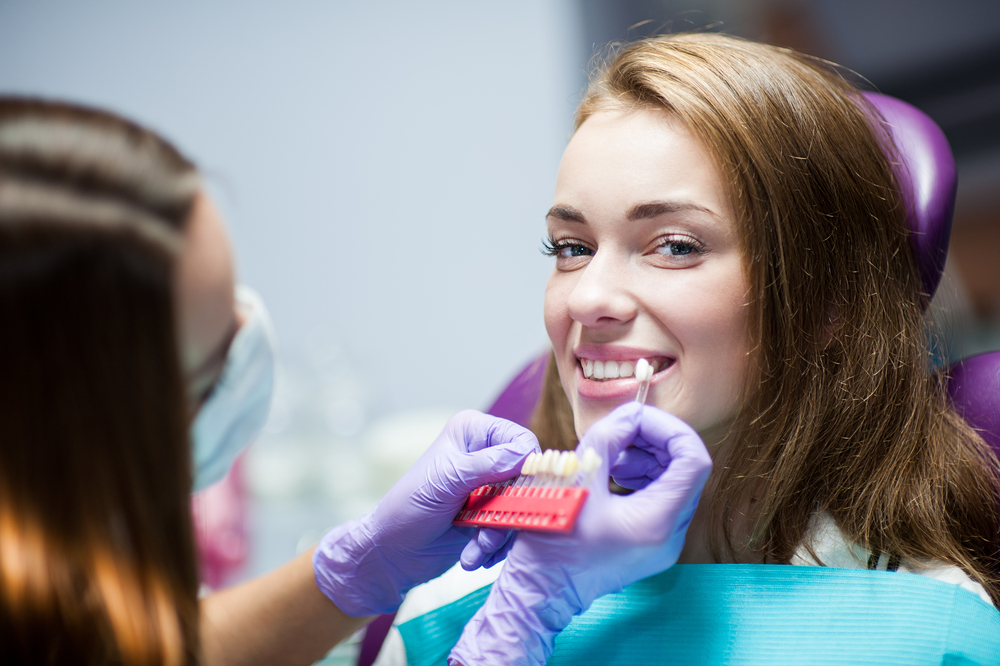
by elision | Apr 4, 2023 | Dentist
There are many ways that teeth can lose their shiny, white luster. Coffee, tea, red wine, cola drinks, and many foods can cause dental staining and discoloration. It can be tempting to reach for the nearest over-the-counter whitening solution when you decide that you want a brighter smile. However, you should first consider the benefits of making an in-office whitening appointment:
Quicker results
At-home teeth whitening kits may be readily available at the drugstore, but they take much longer to whiten your teeth than an in-office procedure does. Most at-home whitening kits require the user to apply the product on a daily basis for weeks or longer in order to see any effect. When you make a dentist appointment to whiten your teeth, you can expect a much quicker process. It’s exciting to see an immediate change in the appearance of your teeth without the risk of doing it yourself.
Safety
At-home whitening kits can seem like a more affordable option than professional services, but when you factor in the risk to the health of your teeth and gums that at-home products present, this is not necessarily the case! Sometimes at-home kits can do more harm than good.
The active ingredient in many whitening kits is peroxide, which lightens the color of your teeth. Many people do not realize that they must handle peroxide with care, as it acts by breaking down your tooth’s enamel. Tooth enamel is important–it protects from cavities and keeps your teeth strong. The misuse of any product that disrupts enamel can have negative effects on your oral well-being.
Many users of at-home whitening products complain that they cause their teeth to become sensitive. Using too much of a product’s solution, or using the product improperly can result in teeth with weakened enamel and increased sensitivity.
Opting for an in-office whitening procedure can greatly mitigate the risk of hurting your teeth. A dentist will make sure your teeth are properly cleaned so that whitening will be safer and more effective. They will make sure that any issues (such as cracked teeth or gum disease) are properly addressed before your simple and non-invasive procedure begins.
Effectiveness
Many at-home whitening products are not as effective as they are marketed to be. Whitening strips might not reach all of your teeth, causing some teeth to remain discolored while others are whitened. Stock whitening trays might not fit your mouth correctly, causing an uneven whitening.
Professional treatment
Before you choose a teeth-whitening option, it is a good idea to consult with your dentist. They can perform an oral screen and examine the kind of staining your teeth exhibit, and they can determine which type of whitening would be most effective for you.
At Smile League Dental, we believe that everyone deserves to have a beautiful, bright smile. We are proud to provide the best teeth whitening services in Joliet and the surrounding areas. Would you like to learn more about your teeth whitening options? Give us a call at 815-782-6243. We would be happy to assist you.
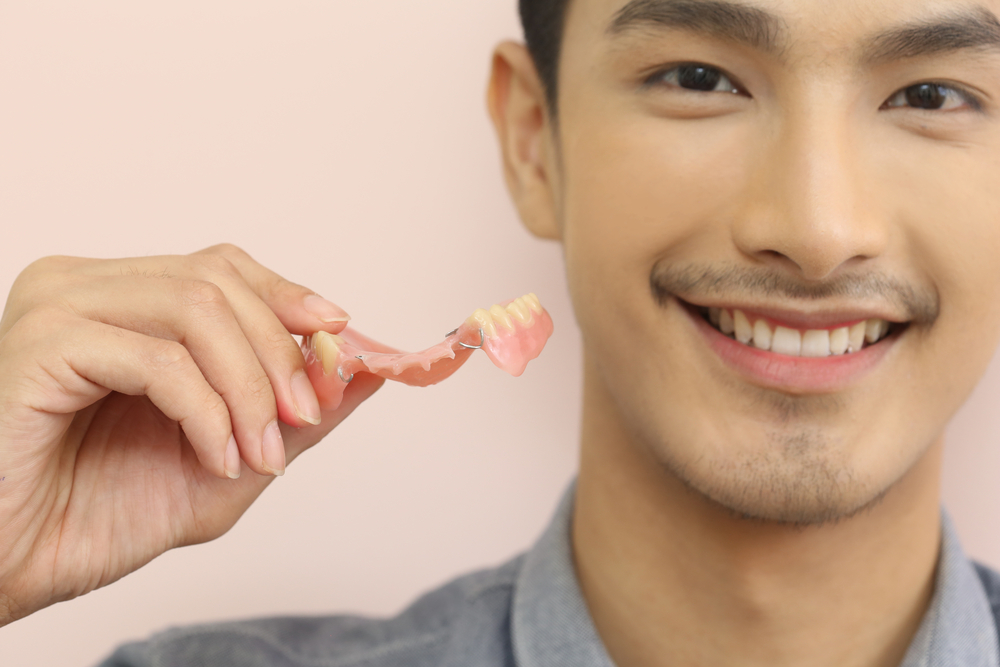
by elision | Mar 13, 2023 | Dentist
If you have missing teeth, there may be different solutions available to you. In some cases, missing teeth can be addressed with one or two individual dental implants. In others, a full set of implants, or full dentures might be the best solution. If a row of teeth is missing, a patient might opt for a fixed bridge. If you are missing just a few teeth, you might be eligible for an easy and cost-effective solution: partial dentures, or “partials.”
What, exactly, are partials? They are removable, prosthetic teeth that can replace missing teeth in your mouth. They are usually attached to a plate that matches the color of your gums. The plate is often held into place with a metal frame that fits into your mouth. Many people choose partials when they are missing some but not all of their teeth, and they wish to avoid the cost and invasiveness of permanent dental implants.
Partials look great, and you can use them in largely the same way that you would use your natural teeth. With proper maintenance, they can last a long time–up to several years. They are an excellent solution when you would like to replace missing teeth, but you still have healthy teeth that can be preserved rather than removed.
Why replace missing teeth?
Sometimes, replacing missing teeth is not essential. It can be an aesthetic choice. There is nothing wrong with wanting a smile full of pearly whites.
In many cases, replacing a missing tooth can help keep the teeth located on either side of a gap healthy. It can keep them positioned correctly, preventing them from loosening or becoming damaged. Tooth replacements can also keep your bite aligned, which can help you avoid painful conditions like TMD (temporomandibular joint dysfunction).
A partial can also help keep food particles from getting jammed into the gaps left by missing teeth, which could otherwise lead to gum disease and infections.
Should I opt for partials or permanent implants?
Permanent implants can be a great option if you want to replace your missing teeth without the hassle of removing and replacing them every day. Their immobility can make them feel more like natural teeth. Another option is a fixed bridge–a row of prosthetic teeth held into place by implanted crowns at each end.
However, if you are interested in achieving a beautiful smile of functional teeth without an invasive and costly dental implant procedure, then partials may be an excellent option for you. It can take time to get used to the routine of removing your partials each night, cleaning them, and replacing them in the morning; but once you do, you may find it to be an easy and agreeable way to keep your mouth healthy and your smile shining.
Contact Smile League Dental
Talking with your dentist is the best way to determine what kind of tooth replacement will work best for you. At Smile League Dental in Joliet, we are happy to discuss your options for replacing missing teeth and answer any questions you might have about your family’s dental health. Call us at 815-782-6243 to schedule an appointment today.
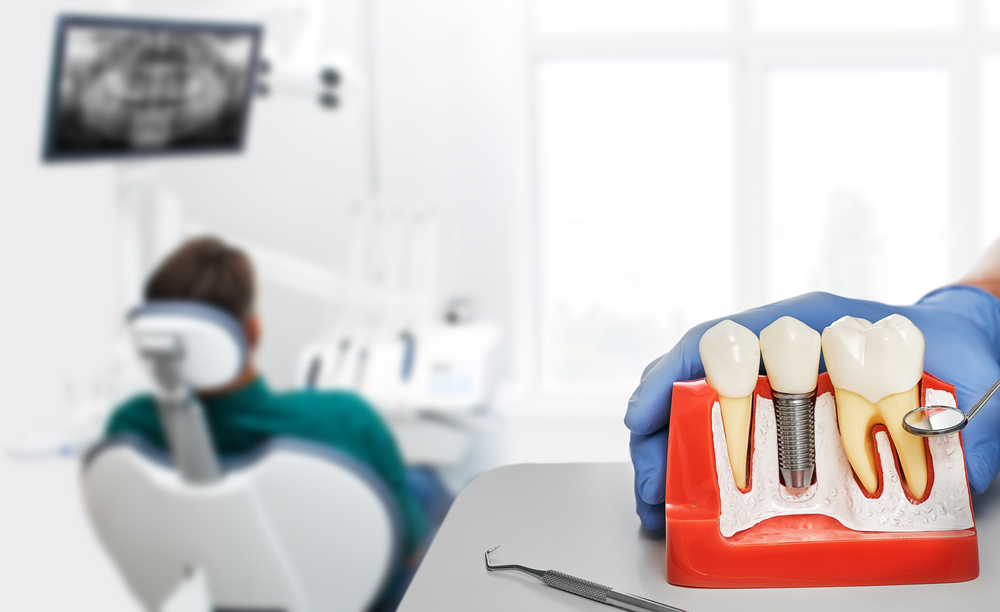
by elision | Jan 30, 2023 | Dentist
Are you interested in getting dental implants in Illinois? If so, you may have plenty of questions about the process for getting them. What is involved? How long does it take? What can you expect? Let’s go over the process of getting dental implants, from start to finish.
The initial evaluation
Before you can begin the process of receiving dental implants, your dentist will have to determine whether or not you are in fact a good candidate for getting them. What makes a person a good candidate for dental implants? Your dental practitioner will make sure that you meet the following criteria:
- Your jawbone has enough strength and density to support implants.
- You have good oral health and your gums are disease-free.
- You are able to commit a timespan of months to the full implant procedure.
Your dentist will check for other factors too, such as whether or not you are pregnant, and if you smoke cigarettes, as these could impact your candidacy.
Determining the type of implant you should receive
During your evaluation, your dentist can help you decide what kind of implant would be best for you. There are several different kinds of dental implants:
- A single-tooth implant works for people who are missing one tooth.
- An implant-supported bridge is a row of crowns that are supported by implants at each end of the row. This option can be ideal for patients who are missing multiple teeth that are next to each other.
- Full-mouth dental implants can be a great option if all or most of your teeth need replacing.
Your dentist will also help you decide how deeply your implants should be placed.
Implant placement
Before the implant is placed, any teeth that need to be taken out will be removed. Then, a titanium post will be inserted into your jaw. The surgery can take around 1 to 2 hours, depending on how many implants you are getting.
Healing
Your jaw and gums will need plenty of time to heal. Your jawbone will integrate itself into the titanium post, making the post sturdy and ready to receive a crown. This healing process can take months. Once you are healed, a small connecting piece called an abutment is placed onto the titanium post.
Making new crowns
Your dentist will make crowns to replace your missing teeth. These will then be attached to the abutments to complete your shiny, new dental implants.
Enjoy your new teeth!
You can now enjoy a bright and healthy smile! Healed dental implants function much the same as natural teeth. Speak with your dentist to find out if there are any foods or habits that you should avoid to make the most of your dental implants.
Caring for your dental implants
Just like natural teeth, dental implants require upkeep. You will need to continue brushing with a soft toothbrush and flossing daily. You should also schedule regular dentist visits to make sure your implants are doing well.
Would you like to schedule an evaluation to discuss dental implants in Joliet? Call Smile League Dental in Joliet today! Our friendly and knowledgeable team would be happy to answer any questions you might have. You can reach us at 815-782-6243.
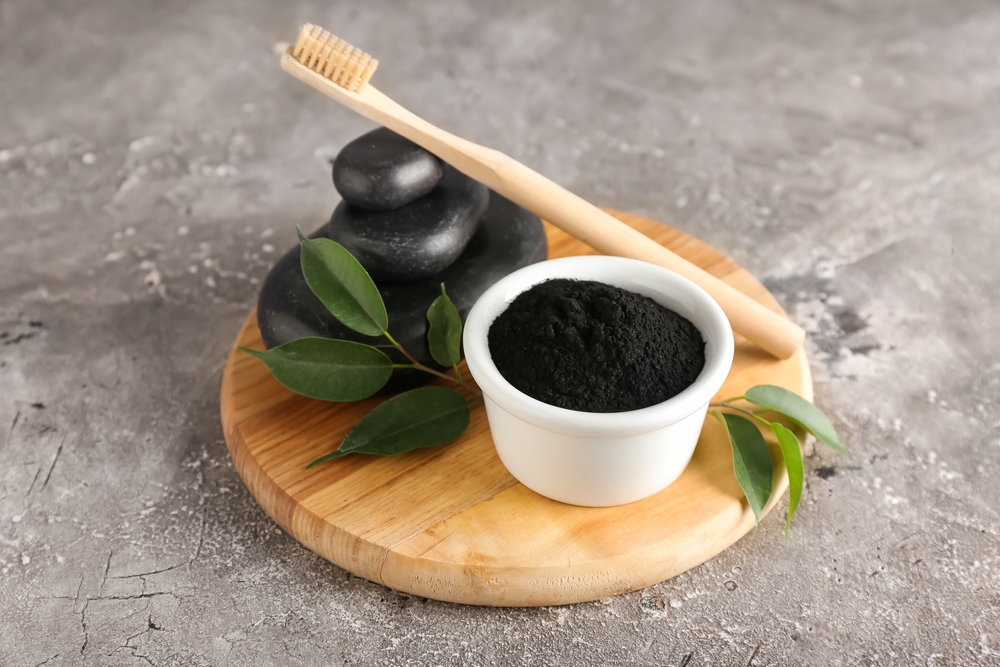
by elision | Jan 2, 2023 | Dentist
You have probably seen tubes of charcoal-infused toothpaste, charcoal floss, and black-bristled charcoal toothbrushes on store shelves while shopping for your oral care items. Using activated charcoal has become a popular way to whiten teeth.
Oral health isn’t the only benefit that people are trying to glean from charcoal. The mineral is used in skin treatments, as food supplements, and even as a natural deodorant. The effectiveness of these myriad usages of activated charcoal is up for debate, but here we will focus on one of its most exciting applications: whitening teeth!
What is activated charcoal?
Activated charcoal is a heat-treated form of charcoal, a carbon residue. Charcoal forms when wood is burned in a low-oxygen environment. Treating charcoal with extremely high temperatures results in charcoal that is extremely porous–a substance that we call activated charcoal.
Traditionally, activated charcoal has many common uses. Its high porosity makes it an excellent tool for absorption. Many emergency room doctors use it to absorb toxins from the bodies of patients who are experiencing poisoning or overdose. Activated charcoal is also used in many water filters, as a natural way to help remove unhealthy compounds from drinking water.
Does activated charcoal really whiten teeth?
If your teeth are yellowed from drinking coffee or tea; from eating foods and spices that contain staining pigments; or from tobacco use, then we have good news for you: activated charcoal can indeed help whiten your teeth. Studies show that the porous substance is effective in reducing surface stains. When you brush with activated charcoal, the fine grains are able to bind to particles staining the surface of your teeth, which helps to remove them.
Is it safe to brush with activated charcoal?
Activated charcoal may be helpful as a teeth whitener, but we recommend that you use it with great care. Despite its current popularity, charcoal may actually be harmful to your teeth. Abrasive grains of charcoal can eat away at the enamel of your teeth, weakening them and leaving them vulnerable to developing cavities. Such wear and tear on tooth enamel could even cause your teeth to become more yellow over time! Many dentists agree that more scientific research is needed to determine the true safety of activated charcoal when it comes to dental health.
How else can I whiten my teeth?
Hydrogen peroxide and baking soda are two substances that are commonly used to whiten teeth. These can be found in many whitening toothpaste. The best effective way to whiten your teeth is to visit your dentist. Dentists can provide safe and effective teeth whitening through bleaching and other treatments that can address both surface stains and discoloration that can appear beneath the enamel of the teeth.
Call Smile League Dental today!
Are you curious about activated charcoal and other teeth-whitening options? Would you like to schedule a consultation to determine if a teeth-whitening treatment is right for you? Please feel free to contact Smile League Dental in Joliet. Our friendly team is happy to share its expertise with you to help you make the best decisions for your oral health.

by elision | Dec 5, 2022 | Dentist
When you brush your teeth and floss each day, you know that you are completing an important daily routine that keeps your mouth clean and healthy. But did you know that scrubbing your pearly whites also helps to keep your entire body in optimal health? Having an unhealthy mouth does not just result in discomfort, pain, and costly dental procedures. Poor dental health can actually affect your digestive, respiratory, and circulatory systems. It can even affect your brain.
Oral bacteria
How can poor dental health have such an impact on an individual’s overall health? One of the primary ways is through oral bacteria. A healthy mouth naturally contains a certain amount of bacteria. However, gum disease and oral infections can cause an overabundance of the wrong kind of bacteria to thrive in the mouth. There are various ways that oral bacteria can spread to the rest of the body:
- Bacteria is swallowed into the digestive system.
- It spreads into the lungs when we breathe in.
- It can be absorbed through blood vessels and into the bloodstream.
Again, consuming a certain amount of bacteria is perfectly normal and healthy. However, if a person has too much bad bacteria in their mouth–perhaps from tooth decay, gum disease, or an infection–they could run the risk of spreading too much harmful bacteria to the rest of their body.
Dental health and diseases
Studies have shown that poor dental health can be associated with a variety of ailments in other areas of the body. What does science know about the link between oral health and certain diseases?
Cardiovascular Disease
Research has shown that poor oral health can lead to blood vessel inflammation and sometimes infection of the inner lining of the heart, both of which can contribute to heart disease.
Alzheimer’s Disease
Scientists are studying how oral health may be linked to dementia and Alzheimer’s Disease. Older people who have gum disease or oral infections may be more likely to develop Alzheimer’s.
Pneumonia
Pneumonia is a dangerous infection of the lungs. Harmful bacteria can travel from the mouth to the lungs when an individual breathes in. When such bacteria reach the lungs, there could be a risk of developing pneumonia.
Inflammatory Bowel Disease
Inflammatory Bowel Disease, or IBD, is a term for digestive diseases that involve inflammation of the digestive tract. Studies have shown that those who suffer from IBD can benefit greatly from maintaining good oral health. Having a healthy mouth can mean fewer IBD symptoms and flare-ups.
Other Diseases and Disorders
Poor dental health may also contribute to the development of pregnancy complications; an increased risk of stroke; skin infections; diabetes; and many other ailments.
Smile League Dental
If you are concerned about maintaining your overall health and well-being through your dental health, or if you simply wish to get the best quality dental care available in the Joliet area, please feel free to get in touch with us. At Smile League Dental, we are passionate about providing our patients with excellent care in a comfortable and family-friendly clinic. You can reach us at 815-782-6243.







Recent Comments